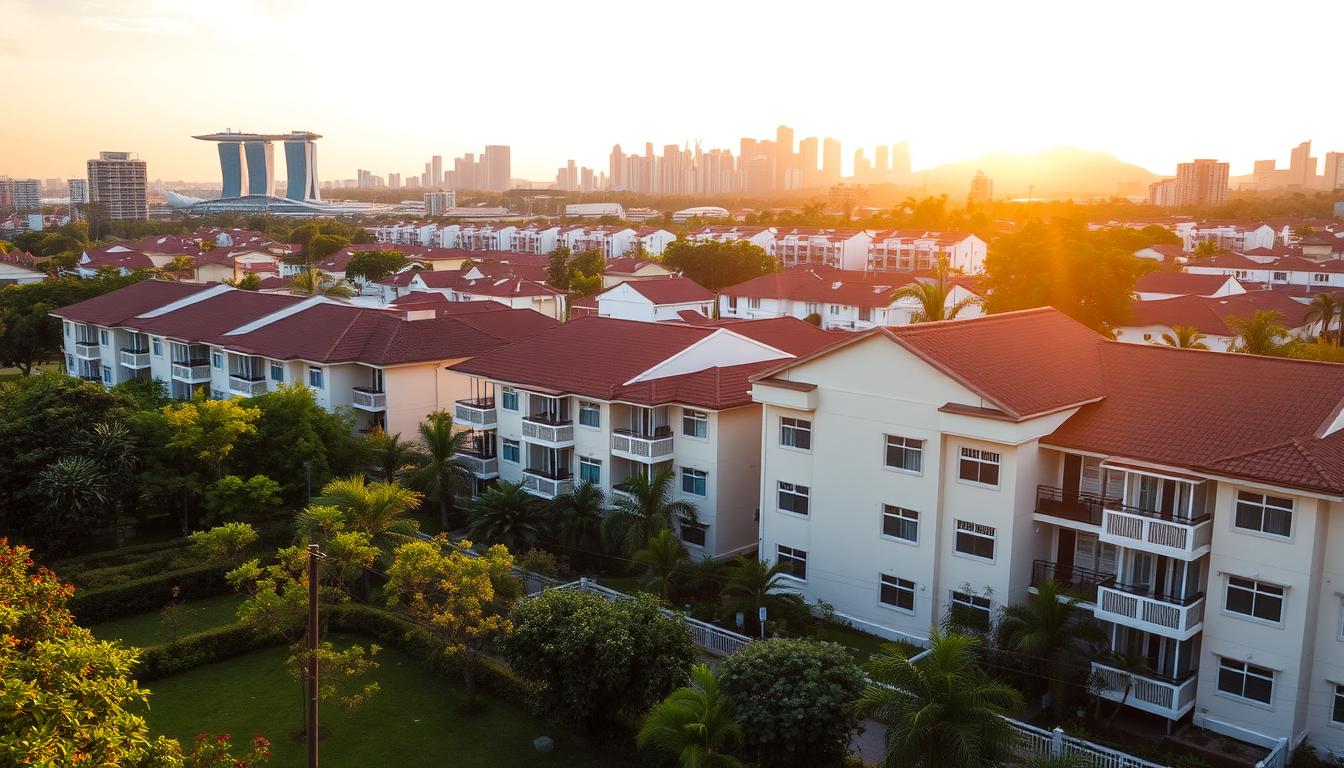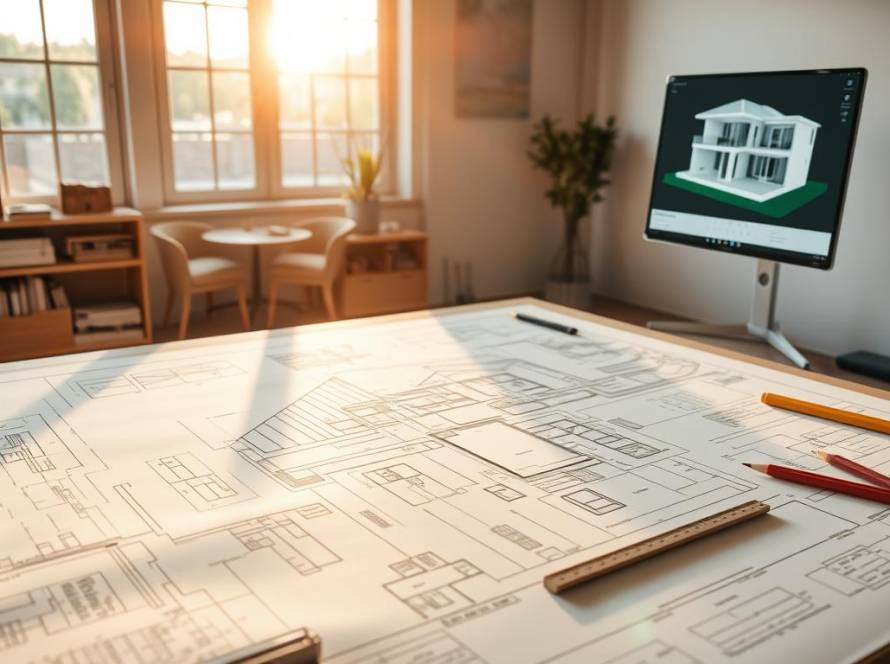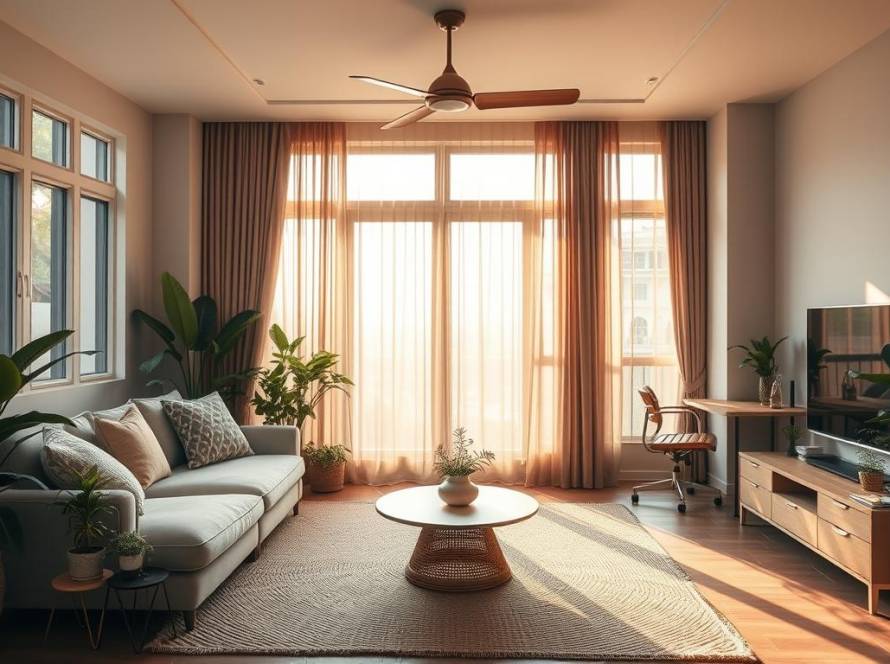Embarking on a home renovation project in Singapore can be a daunting task, especially for first-time homeowners. With so many factors to consider, it’s essential to be prepared. We will share valuable insights and house renovation advice to help you navigate the process, from understanding the local housing landscape to managing renovation costs.
Our expert guidance will enable you to achieve your dream home in Singapore. We will cover essential topics to ensure a successful renovation project.
Understanding the Singapore Housing Landscape
As a homeowner in Singapore, understanding the nuances of the local housing landscape is crucial for making informed renovation decisions. Singapore’s housing market is diverse, comprising HDB flats and private condominiums, each with its unique characteristics and renovation guidelines.
The type of housing you own significantly impacts the renovation options available to you. For instance, HDB flats have specific renovation guidelines that homeowners must adhere to, ensuring that any modifications comply with the Housing and Development Board’s regulations.
Here are some key aspects to consider when understanding the Singapore housing landscape:
- The type of housing you own (HDB flat or private condominium)
- Renovation guidelines specific to your housing type
- Potential constraints and possibilities for renovation
Understanding these factors will help you navigate the renovation process more effectively, ensuring that your project is successful and stress-free.
Let’s take a closer look at the characteristics of HDB flats and private condominiums:
- HDB flats are subject to specific renovation guidelines and regulations
- Private condominiums often have their own set of rules and regulations
By understanding the Singapore housing landscape, you can make informed decisions about your renovation project and ensure that it meets your needs and complies with relevant regulations.
Planning Your Renovation Project
Another house renovation advice is an effective renovation planning. Because it is the backbone of a successful home renovation project in Singapore. A well-planned renovation helps homeowners achieve their desired outcome without unnecessary delays or cost overruns. In this section, we will explore the essential steps involved in planning your renovation project.
Setting Clear Renovation Goals
Setting clear renovation goals is the first step towards a successful project. It’s essential to define what you want to achieve with your renovation. Are you looking to increase your home’s value, improve its functionality, or simply update its aesthetic appeal? By having clear goals, you can make informed decisions throughout the renovation process.
To set effective renovation goals, consider factors such as your budget, the age and condition of your property, and your personal preferences. It’s also helpful to consult with renovation experts to gain a better understanding of what’s feasible and what’s not.
Creating a Realistic Timeline
Creating a realistic timeline is crucial for managing expectations and ensuring that your renovation project stays on track. A realistic timeline takes into account the complexity of the renovation, the availability of materials and labour, and potential unforeseen delays.
To create a realistic timeline, break down your renovation project into smaller tasks and allocate specific timeframes for each task. It’s also essential to work closely with your renovation contractor to understand their schedule and any potential bottlenecks.
Prioritising Renovation Areas
Prioritising renovation areas is vital when working with a limited budget or facing time constraints. Identify the areas of your home that need the most attention and allocate your resources accordingly.
Consider the functionality and aesthetic appeal of each area, as well as the potential impact on your home’s value. By prioritising your renovation areas, you can ensure that the most critical aspects of your project are completed to a high standard.
Budgeting Wisely for Home Renovations
Budgeting for a home renovation in Singapore involves more than just estimating costs; it requires a strategic approach. A well-planned budget helps homeowners manage their renovation projects efficiently, avoiding cost overruns and ensuring that the final result meets their expectations.
Average Renovation Costs in Singapore
The cost of renovating a home in Singapore can vary significantly based on factors such as the size of the property, the materials used, and the extent of the renovation.
- HDB flats: SGD $30,000 to $80,000 or more
- Private properties: SGD $100,000 to $500,000 or more
Understanding these average costs helps homeowners set a realistic budget for their renovation projects.
Hidden Expenses to Anticipate
Beyond the obvious costs of materials and labour, there are several hidden expenses that homeowners should anticipate when budgeting for a renovation.
- Temporary accommodation costs if the renovation renders the home uninhabitable
- Costs associated with obtaining necessary permits and approvals
- Potential structural repairs or modifications discovered during the renovation
Allocating a contingency fund of 10% to 20% of the total budget can help mitigate these unexpected expenses.
Financing Options Available
Homeowners in Singapore have several financing options available to fund their renovation projects.
- Renovation loans from banks and financial institutions
- Using savings or emergency funds
- Renovation packages offered by contractors that include financing options
It’s crucial to compare these options carefully, considering factors such as interest rates, repayment terms, and any associated fees.
By understanding average renovation costs, anticipating hidden expenses, and exploring financing options, homeowners can create a comprehensive budget that covers all aspects of their renovation project.
Take control of your renovation budget—compare financing options today and choose the one that best fits your needs and financial goals. At Fortified, we offer affordable and reliable renovation services tailored to your budget, so you can renovate with confidence and peace of mind.
Essential House Renovation Advice for Singaporeans
Singapore’s tropical climate presents unique challenges for homeowners, making it essential to incorporate climate-appropriate design choices during renovation. As we renovate our homes, we must consider the local environment to create a comfortable and sustainable living space.
Climate-Appropriate Design Choices
When designing your home, it’s crucial to consider the local climate. Singapore’s hot and humid weather requires specific design elements to ensure comfort and reduce energy consumption.
- Use light-coloured finishes and materials to reflect sunlight and heat.
- Incorporate natural ventilation techniques, such as large windows and ventilation shafts, to reduce the need for air conditioning.
- Install shading devices, like awnings or solar screens, to block direct sunlight.
Space Optimisation Techniques for Smaller Homes
Many homes in Singapore are designed to be compact, making space optimisation crucial. By using the right techniques, you can create a spacious and functional living area.
- Utilise multi-functional furniture to reduce clutter and increase functionality.
- Opt for built-in storage solutions to keep your home organised.
- Consider vertical space by installing floor-to-ceiling shelves or storage units.
Energy-Efficient Upgrades
Energy efficiency is not only good for the environment; it also helps reduce your utility bills. When renovating, consider incorporating energy-efficient upgrades.
- Install LED lighting, which consumes significantly less energy than traditional lighting.
- Upgrade to energy-efficient appliances to reduce your energy consumption.
- Consider installing solar panels to generate renewable energy.
Selecting the Right Renovation Professionals
Selecting experienced renovation professionals is vital to bringing your vision to life. We understand that hiring the right contractors and interior designers can be a daunting task, but it’s crucial for a successful renovation project.
When searching for renovation professionals, there are several factors to consider. We recommend starting by asking for referrals from friends, family, or colleagues who have recently renovated their homes. This can provide valuable insights into a contractor’s or designer’s work quality, reliability, and communication skills.
It’s also essential to check the credentials of potential renovation professionals. Ensure they are registered with relevant Singaporean authorities, such as the Building and Construction Authority (BCA) or the Interior Design Association (IDA). This verification process helps guarantee that you’re hiring qualified individuals who adhere to industry standards.
Once you’ve shortlisted a few candidates, we suggest conducting interviews to assess their understanding of your project. Prepare a list of questions, such as their experience with similar projects, their design philosophy, and how they plan to manage potential issues that may arise during the renovation.
- Check their portfolio to ensure their style aligns with your vision.
- Request a detailed quotation to understand their pricing and what’s included.
- Discuss their project management process and communication strategy.
By following these steps and being diligent in your selection process, you can find the right renovation professionals to help you achieve your desired outcome. We emphasize the importance of taking your time and not rushing into a decision, as it can significantly impact the success of your renovation project.
Navigating Permits and Approvals
To avoid delays and penalties, it’s essential to navigate the permit and approval process correctly when undertaking a renovation project in Singapore.
Renovation permits are required for most renovation works, especially those that involve structural changes or alterations to the electrical and plumbing systems. The type of permit needed depends on the nature of the renovation. For instance, if you’re renovating an HDB flat, you’ll need to obtain approval from the Housing and Development Board (HDB).
The approval process typically involves submitting plans and documents to the relevant authorities, such as the Building and Construction Authority (BCA) or the HDB, depending on the type of property you’re renovating. It’s crucial to ensure that your renovation plans comply with the relevant regulations, including the Building Code of Australia (BCA) and HDB regulations.
Some key considerations when navigating permits and approvals include:
- Understanding the types of permits required for your renovation project
- Ensuring compliance with HDB regulations and other relevant authorities
- Submitting the necessary documents and plans for approval
- Allowing sufficient time for the approval process
By understanding the permit and approval process, you can avoid costly delays and ensure that your renovation project is completed on time and within budget. We recommend working closely with your renovation contractor or a professional consultant to ensure that all necessary permits are obtained and that your renovation complies with the relevant regulations.

Smart Material Choices for Singapore Homes
When it comes to renovating your home in Singapore, the materials you choose play a crucial role in determining the overall success of your project. The right materials can significantly impact the durability and maintenance of your home.
Humidity-Resistant Options
Singapore’s tropical climate means that homes are often exposed to high levels of humidity. To combat this, it’s essential to choose materials that are resistant to moisture damage. Some popular humidity-resistant options include:
- Engineered wood flooring
- Porcelain tiles
- Waterproof laminate
These materials are designed to withstand the humid climate and reduce the risk of damage to your home.
Sustainable and Eco-Friendly Materials
In addition to being durable, it’s also important to consider the environmental impact of your material choices. Sustainable and eco-friendly materials are becoming increasingly popular in Singapore, and for good reason. Some benefits of these materials include:
- Reduced environmental impact
- Improved indoor air quality
- Energy efficiency
Some examples of sustainable materials include bamboo, reclaimed wood, and low-VOC paints.
Cost vs. Longevity Considerations
While it’s tempting to opt for the cheapest materials available, it’s essential to consider the long-term costs and benefits. Cheaper materials may need to be replaced more frequently, which can be costly in the long run. On the other hand, investing in higher-quality materials can save you money in the long term.
When making your material choices, consider the cost vs. longevity of each option. Ask yourself:
- How long is the material likely to last?
- What are the maintenance requirements?
- Will the material need to be replaced frequently?
By considering these factors, you can make informed decisions about your material choices and create a beautiful, functional, and sustainable home.
Managing Renovation Challenges
Despite meticulous planning, renovation challenges are inevitable, but with the right strategies, homeowners can navigate these issues effectively. Renovation projects in Singapore, like elsewhere, can be fraught with challenges that test the patience and resolve of homeowners.
Dealing with Contractor Delays
Contractor delays are one of the most common renovation challenges. To mitigate this, it’s essential to create a detailed project timeline with clear milestones and deadlines. Regular communication with your contractor can help identify potential delays early on.
- Establish a clear communication channel with your contractor.
- Set realistic expectations and timelines.
- Regularly inspect the work progress.
Handling Unexpected Issues
Unexpected issues, such as hidden structural damage or delayed material deliveries, can arise during renovation. Being prepared for such eventualities is key.
- Conduct thorough inspections before starting the renovation.
- Budget for contingencies.
- Have a flexible plan that can accommodate changes.
Neighbour Relations During Renovation
Maintaining good neighbour relations is crucial during the renovation process. Being considerate of noise levels and ensuring that your renovation does not inconvenience your neighbours can go a long way.
- Inform your neighbours about the renovation timeline.
- Be mindful of noise levels and work hours.
- Keep your neighbours updated on any significant changes.
By understanding these renovation challenges and implementing strategies to manage them, homeowners in Singapore can ensure a smoother renovation experience. Effective planning, clear communication, and a flexible approach are key to overcoming the inevitable challenges that arise during renovation projects.
Conclusion
Renovating your home in Singapore is a significant undertaking that requires careful planning, budgeting, and execution. By following the house renovation advice provided in this article, you’ll be well on your way to achieving your dream home.
We’ve covered essential topics to ensure a successful renovation project, from understanding the local housing landscape to managing renovation challenges. Our comprehensive guide has equipped you with the knowledge to create a beautiful and functional home that meets your needs and enhances your quality of life.
As you embark on your renovation journey, remember to stay focused on your goals and be prepared to adapt to any unexpected issues that may arise. With the right mindset and professional guidance, you can achieve a renovation conclusion that exceeds your expectations.
Start planning your renovation today—connect with trusted professionals renovation contractor and turn your vision into reality.



